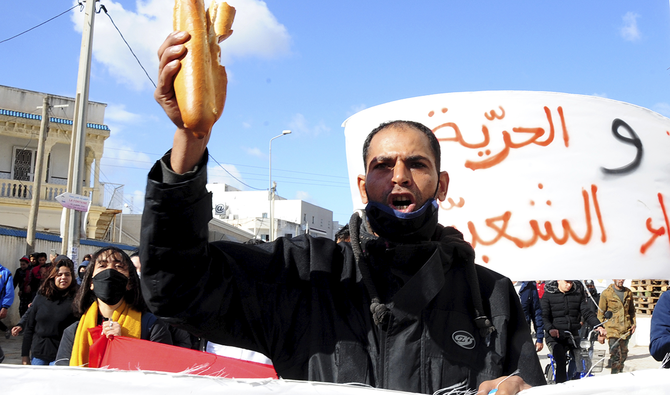TUNIS: Tunisian police slapped and arrested a photojournalist working at night despite his having an authorization to be out after curfew, the national press syndicate said on Wednesday amid criticism of the security forces’ handling of protests.
Islem Hkiri, a freelance photographer, was charged with breaking curfew and assaulting a public servant.
He had earlier published pictures of police using pepper spray during a recent surge of protests in Tunisia, a democracy since the 2011 revolution that inspired the “Arab spring.” Protesters have decried both inequality and police abuses.
Security forces have arrested more than 1,200 people including many under the age of 18 and have widely used teargas against demonstrators. Although daytime protests have mostly been peaceful, those at night have involved repeated clashes with police as well as some looting.
The Journalists’ Syndicate condemned police violence and asked the Interior Ministry for an immediate investigation.
An Interior Ministry spokesman said he could not comment on a file in the hands of the judiciary.
A judicial official was not immediately available for comment.
Tunisian rights groups have criticized what they call the police’s aggressive handling of protesters and the arrest of bloggers.
The opposition and activists also criticized the unprecedented security measures and restrictions on the freedom to demonstrate, and the closure of streets in the capital against protests on Tuesday.
They accused the prime minister of seeking to restore a security state like that which existed before the 2011 uprising.
Prime Minister Hichem Mechichi said the government wanted to protect property but would defend the right to protest, a freedom gained after revolution.
A video showed a policeman firing tear gas at a man who appeared from his house during recent clashes. It sparked anger and doubts about the credibility of police reform over the past decade.
Suspicious powder
The office of Tunisia’s president has received a letter containing suspicious powder and is investigating the matter, a source there said on Wednesday.
President Kais Saied did not open the letter and is in good health, the source said.
Some local websites reported that the lethal toxin ricin had been found in the envelope, and that it had been addressed to the presidency in the Carthage Palace.
The source in the office declined to comment on the reports.
Factional tensions have been growing within the government, amid protests.













